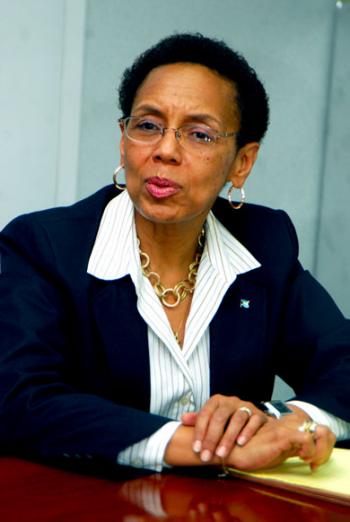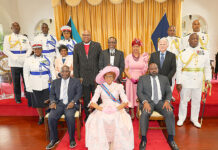
Nassau, Bahamas – The following are remarks by Sen. The Hon. Allyson Maynard Gibson, QC Attorney-General and Minister of Legal Affairs at The Bahamas Bar Association First Training And Education Retreat, on Friday, June 26th, 2015:
Thank you for inviting me to give remarks at this Bahamas Bar Association retreat event under the theme – “The legal practice in a 21st century Bahamas”. Congratulations on holding this Retreat that provides time for introspection, collegiality and strengthening of the relationship between Bench and Bar.
Certainly any of you who have read any of Professor Richard Susskind’s books know that he predicts “The End of Lawyers” (at least practice as many of us know it) in his book by the same name. Much of what he predicted has come true and rapid change continues. I find his concepts exciting. Indeed, efficient administration of law firms opens the door to lawyers having more time for “lawyering” and even greater development of jurisprudence. Rapid changes in the law, as well as the responsibility of “lawyer client privilege” in an increasingly intrusive world, call for the highest standards of practice and training (including continuing education).
We can all agree that education and training are key components in development of local jurisprudence and generally the practice of law within our country. What could be more important to our jurisprudence than the continued advancement of membership of the Bar and bench, towards the most noble of goals, the advocacy of the rule of law within our Commonwealth?
Each of us has a responsibility to protect and undergird the Rule of law.
Colleagues, we are at a pivotal point in our Nation’s history. We have accumulated a significant amount of local jurisprudence in most areas of the practice of law. Indeed we are observing that our integration into international regulatory frameworks brings with it the added requirement that we extend our competencies into new areas of practice. We are also experiencing more and more the call to open our doors to allow non-nationals with unique competencies to be called to the Bar and to practice, including in their own law firms in The Bahamas. This too points to the need for training to assure highest standards pertain in The Bahamas.
It is critical to our competitiveness as a country to promote that we, the members of the Bar Association, continue to be competent and capable of handling complex matters that may arise within our jurisdiction. And, where necessary we can engage expertise from outside The Bahamas to assist.Further, our Judges are more than capable of hearing submissions on complex legal issues and give Rulings. It is within this context that the Bar Association, since I was Secretary to Bar Council, has been advocating for a Practicing Certificate. Since then colleagues said, “Oh, we’ll never get it past those lawyers in Cabinet”. I’ve thought about why ours is one of the few professions that does not mandate continuing education – which is really what a practicing certificate is all about. I’ve come to the conclusion that the real answer may be that the Bar Association itself does not agree that continuing education should be mandatory.
We recently passed the Medical Act. Doctors agreed with the importance of continuing education. The same can be said about accountants, engineers and architects. I urge upon you to embark upon a public information campaign for lawyers and the general public so that there also will be “ground up” support for this concept, expected in the 21st century.“Those lawyers in Cabinet” are patriots who understand that in the 21st century, we Bahamians must compete with counterparts around the world. Like you, we embrace excellence.
The Bar Association must assure that all stakeholders understand why a practicing certificate is being suggested. Mr. President and Council members it is squarely within your remit and you are obligated to conduct consultation with your members. Members it is squarely upon your shoulders to provide comments. This is your Bar Association. You must state whether you agree or disagree, why you agree or disagree and to offer alternative solutions for consideration. I believe that, as in other jurisdictions and other professions, continuing education will indicate that we embrace excellence and professionalism. As an aside, I look forward to receiving the comments from the Bar Association on the Legal Profession Act. It does concern me that it has been suggested that the hardworking Team at the Office of the Attorney General is holding up this legislation when the fact is that the proverbial ball is in the court of the Bar Council.
A progressive legal system requires that we also improve the administration of justice. Both advocacy and the delivery of justice must complement each other. We must also strive to improve on the quality and time frame for the delivery of judgments being produced in our courts. Remedying the inefficiencies found in the delivery of justice must be a priority! Legal practitioners and their clients and the reputation of The Bahamas are being adversely impacted by increasing delays of the Supreme Court in producing judgments. I am advised that in some courts judgments have been outstanding for more than four years. I have been also advised that judgments in some interlocutory matters have been outstanding for over one year. In many other jurisdictions this would be considered judicial misconduct and an abuse of power! By whatever yardstick is used, this is unacceptable and it reflects poorly on our legal system! Bar Council and the Inner Bar must openly discuss inefficiencies like this towards finding a solution! That is what is required of a progressive legal system of which we are all stakeholders with various interests!Again I want to impress upon the Bar Council that it must continue to represent the interest of its membership towards this end!
The question then becomes what can be done? I note that years ago the President of the Court Appeal suggested that we establish a Judicial Training Institute. During Sir Dennis Byron’s recent visit I had the opportunity to discuss with him participation in the Caribbean Court of Justice’s judicial training institute. Again, the voice of the Bar Association must be heard in the matter.
We must also begin to address the Supreme Court Registry, which is in dire need of evaluation, repair and process reengineering. A senior member of the Bar, practicing in civil litigation, called me late last night after Senate to urge me to speak about the Registry. That person indicated a non-objection to me quoting them: “quite frankly the present state of the registry leaves much to be desired and is an impediment to the entire legal system!”
From the perspective of the practicing attorney we must always have in mind the question ‘what does it mean to have a progressive legal practice’? It means that attorneys must form an understanding of their role in the efficient administration of justice. It always means that we take care about what we represent and how we present whether or not we are wearing our wig and gown. It means that members are more than ever responsible for the efficient management of their legal matters and that they are willing to improve on the quality of their legal representation.
This means that there is a greater responsibility on the Bar to ensure that its members are adequately equipped to perform as advocates. The responsibility is on each and every one of you to serve as advocates for and representatives of this noble profession and serving not only yourselves but your fellow members bound by the tradition of excellence. It is critical that we learn to appreciate the value of accreditation and training as core mechanisms of self-regulation. The Bar must accept that if one of its members is deemed incompetent or unethical then it is a reflection on the entire membership. To allow for such a betrayal of our fundamental principles as an institution tasked with stewardship of the rule of law would betray the noble heritage and tradition of excellence passed to us by our very learned seniors.
In this regard, what is required of the Bar is the active mentorship of its junior members to be provided for by more senior members of the Bar association. Senior members of the Bar should always try to make time for mentoring of junior members as this is the only way to pass on our unique legal traditions. Junior members should never be isolated or deprived of the wisdom of the Bar’s senior membership. It is simply a matter of the responsible preservation of the vast intellectual resources within the Bar. Equally so, the junior members must also be active participants in the development of the Bar. It is incumbent upon them to bring the Bar into the 21st century with their knowledge of technology innovations and their perspective on the practice of law within the context of our modern society. These are contemporary times and it is important that we adopt contemporary thinking to improve the delivery of justice within our Commonwealth. Indeed there must be a balance between the heritage found in the intellectual resources of the senior membership and the innovation and contemporary perspectives of the junior membership. It is important that we encourage and advance a higher level of interfacing between the senior and junior membership. Workshops and seminars such as this encourage that interfacing and provide a platform for face-to-face mentoring and networking.
Fellow members, it is laudable that you have taken the time to come out to this retreat because of the valuable resources that the Bar association has made available to you. Many of the esteemed panelists bring with them a wealth of knowledge and experience, which they have and will share with you. I encourage you to listen attentively! It is only left to each of you to put on your thinking caps and participate. Whether or not you are 30 years at the Bar or a member of few months, we value your contribution and comments
I encourage each and every one of you to pursue knowledge with the intent of adopting a spirit of excellence in your advocacy and practice. As members of the Bar, this is what the rest of society requires of you. When you decided to become a member of The Bahamas Bar, I am certain that each of you understood that practice at this Bar will require incredible sacrifice, commitment and the full extent of your competence. Today we are asking you to extend even further beyond those limits. The end result will be a more fruitful and rewarding experience for both you and your clients. Indeed the entire Commonwealth of The Bahamas will benefit from an improvement in the quality of your service.
I thank the members of the Bench and Bar who have worked with my Team and me in pursuit of excellence in the administration of justice.
Bar Council I thank you for your hard work over the past year. I think we can all acknowledge that membership on the Bar Council requires hard work and dedication to the community, which it serves. There is a synthesis of responsibility to Bar membership and responsibility to community because it is key not only that we help members to grow and develop but also that you serve the wider community. Indeed it is fundamental to the relevance and effectiveness of the Bar as a pillar strengthening the application of the rule of law undergirding the pillars of our democracy.
Thank you for your attention and I wish each of you a productive retreat!











